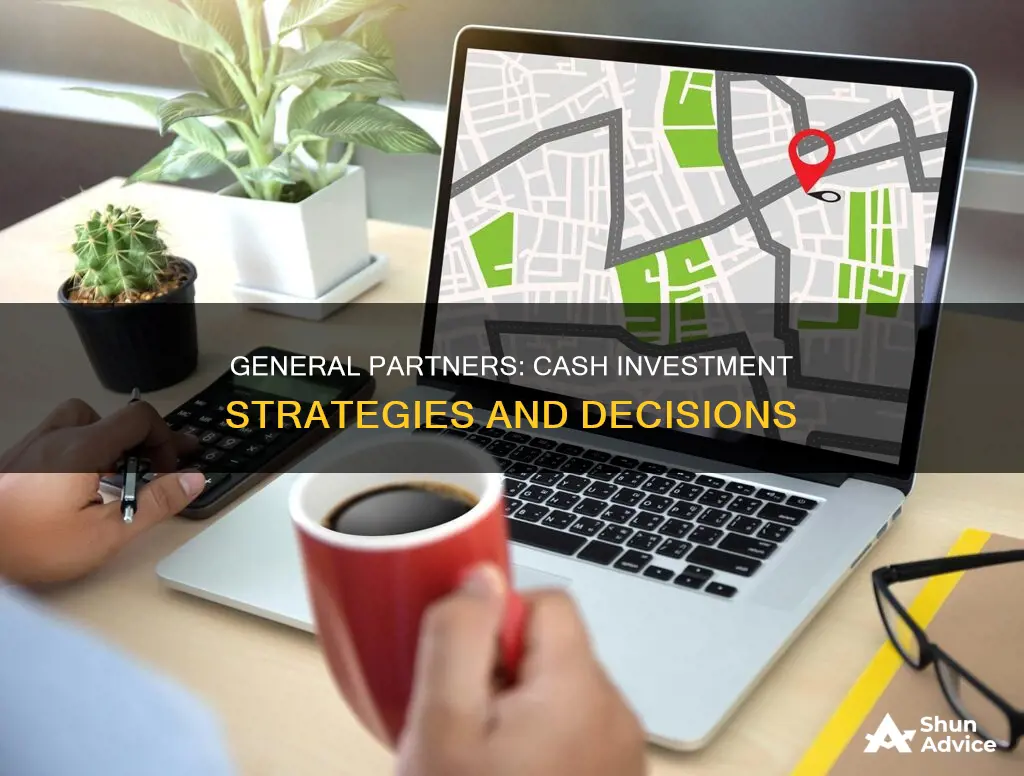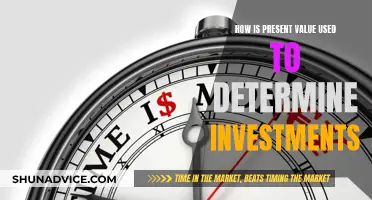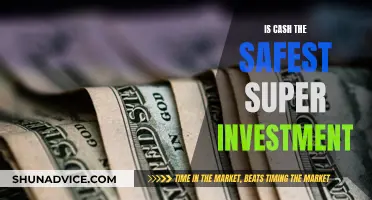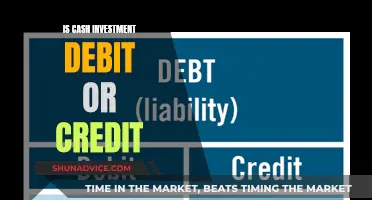
A general partner (GP) is an individual or group of individuals who manage a venture capital fund. They are responsible for raising and allocating investor capital, supporting the founders of the companies they invest in, and making final decisions on how the fund's capital will be allocated. GPs are usually co-investors with all the other partners but are the ones who make all the business decisions and manage the fund's operations. They also have skin in the game, meaning they invest their own money into the fund. In this way, they shoulder greater risk and responsibility than limited partners (LPs) in return for greater rewards.
| Characteristics | Values |
|---|---|
| Nature of work | General Partners (GPs) are responsible for managing a venture capital fund. They raise and allocate investor capital, and support the founders of the companies they invest in. |
| Decision-making | GPs make all the business decisions and manage the fund's operations. |
| Investment | GPs generally invest their own money into their fund. They also invest on behalf of the Limited Partners (LPs). |
| Risk | GPs are exposed to the fund's business risk and have unlimited liability. |
| Returns | GPs receive management fees, carried interest, and distributions from the fund. |
What You'll Learn

General partners invest their own money
A general partner (GP) is an individual or group of individuals who manage a venture capital fund. They are responsible for raising and allocating investor capital and supporting the founders of the companies they invest in. GPs are usually co-investors with all other partners, but they make all the business decisions and manage the fund's operations. They monitor the fund's performance and send out information to investors.
GPs have "skin in the game", meaning they invest their own money into their fund. They also raise money from investors (known as limited partners or LPs) and find quality deals. This can be challenging, especially in a competitive venture capital space.
GPs get paid through management fees, carried interest, and distributions from the fund. Management fees are usually annual and charged on the fund's total commitments. Carried interest is a performance bonus when the fund produces returns. Distributions from investments allow GPs to profit alongside the fund's LPs.
There are several advantages and disadvantages to being a GP. On the upside, GPs can enjoy substantial returns from successful investments and have a large degree of control over running the fund. They can also progress in their careers by raising bigger funds and building their networks. However, being a GP is time-consuming and involves a long feedback loop, as it can take 5-10 years to see the results of investments. Additionally, GPs typically contribute 1-5% of the fund's total size using their own money, which may require a personal loan or offsetting management fees.
Investing Activities: Do Cash Flows Stay Positive?
You may want to see also

They have skin in the game
A general partner (GP) is a manager of a venture fund. They are responsible for raising and allocating investor capital and supporting the founders of the companies they invest in. They are also in charge of making all the business decisions and managing the fund's operations, monitoring its performance, and sending out information to investors.
GPs of venture funds generally have "skin in the game", meaning they invest their own money into their fund. They are exposed to the fund's business risk and have unlimited liability for the fund's losses. In return for their fund management, they receive admin fees, usually calculated as a percentage of the capital invested, and something known as "carried interest" or "carry". Carried interest is a share of the profits of an investment that is paid to the investment manager, beyond the amount contributed to the fund. It serves as a performance fee and aligns the interests of the manager with those of the investors.
GPs can get paid in three ways:
- Fund management fees: There is usually an annual fee charged on the fund's total commitments, typically around 2%. This fee is intended to compensate GPs for their time and be used to pay for operational costs such as staff salaries, office space, legal fees, taxes, and travel.
- Carried interest: This functions as a performance bonus for the GPs when the fund produces returns. Carried interest is typically 20% of the fund's profits and goes to the GPs.
- Distributions from investments: Since GPs usually invest their personal capital in the fund, they can also profit from the distributions alongside the fund's limited partners (LPs).
Overall, GPs play a crucial role in the success of a venture fund and have a significant amount of skin in the game due to their personal investment and unlimited liability for the fund's losses.
Cash Investment Strategies: Your Guide to Profitable Opportunities
You may want to see also

They build relationships with other VCs
General partners (GPs) are the managers of a venture fund. They are responsible for raising and allocating investor capital and supporting the founders of the companies they invest in. They are also tasked with making the final decisions on how a fund's capital will be allocated.
GPs are compensated through management fees, carried interest, and distributions from the fund. They are expected to have "skin in the game" and invest their own money into the fund.
GPs build relationships with other VCs to solidify partnerships and expand their network. VCs often work like a syndicate, dealing with certain firms repeatedly, which fosters trust, respect, and a positive reputation.
- Investing in What They Know: GPs are experts in the VC landscape and are familiar with successful fund managers. By investing in what they know, they can maximize their returns and invest in talented individuals they believe in.
- Information Access: GPs have access to information that others may not. Through their connections and communications with other GPs, they learn about up-and-coming companies and gain insights into other parts of the VC industry.
- Pipeline Building: By investing in promising early-stage companies, such as series A or seed funds, GPs can build a strong pipeline for future opportunities.
- Supporting Former Team Members: GPs may invest in a VC fund started by a former team member as a way to show support and signal their belief in that person's capabilities.
- Signalling: Signalling is important in the VC world. Investing in another VC's fund can be a way to show support and respect, leading to potential future collaborations.
- Trust and Respect: Building relationships with other VCs fosters trust and respect between professionals in the industry. This can lead to more stable and productive collaborations in future deals.
- Shared Values: GPs are more likely to work with fellow VCs who share similar values and work ethics. This alignment creates a stronger foundation for potential partnerships and collaborations.
By focusing on building relationships, GPs can expand their network, gain access to valuable information, and foster trust and respect in the VC industry. These relationships can lead to future collaborations, deal flow, and potential investment opportunities.
Cashing Out Investments: Using the Cash App to Withdraw Funds
You may want to see also

They invest in what they know
General partners (GPs) are the managers of a venture fund who raise and allocate investor capital and support the founders of the companies they invest in. They are responsible for raising money from investors, known as limited partners (LPs), and finding quality deals. GPs get paid through management fees, carried interest, and distributions from the fund.
GPs of venture funds have "skin in the game", meaning they invest their own money into their fund. They are privy to information that others are not, and they are often building relationships and solidifying partnerships with other VCs.
GPs tend to invest in what they know, which is often other VC funds. This is because they are already familiar with the VC landscape and likely know who the good fund managers are. As investors, they want to maximize their returns and investing in what they know is a way to do this. They will invest in someone they recognize as a great talent and believe in their own convictions.
Additionally, GPs are often building a pipeline of promising companies for the future. They receive letters and investment insights, and often learn about what's happening in other parts of the VC industry through these means. This allows them to stay informed and make investment decisions based on their knowledge and expertise.
By focusing their stock picks on companies and industries that interest them, GPs can make more informed choices. Their insider knowledge gives them an advantage, but it should not be an excuse to avoid doing due diligence before investing.
Cash App Investment Options: Where to Put Your Money
You may want to see also

They have unlimited liability
A general partner is a manager of a venture fund. They are responsible for raising and allocating investor capital and supporting the founders of the companies they invest in. They are also responsible for the daily management of the business and have unlimited financial liability.
General partners have full management control of the business and unlimited financial liability for their financial obligations. This means they are responsible for all management decisions and are liable for any debts or mishandling of the business.
In a general partnership, every partner can enter into contracts or business deals that are binding on every other partner. This can be convenient, but it also means that partners should trust each other. A partner's actions or mistakes can affect the others legally and financially.
General partners are entitled to compensation for their participation in the partnership. They are not considered employees, so they do not receive a salary. Instead, they receive distributions from the partnership's profits, in line with their share of profits as outlined in the partnership agreement.
The hallmark of a general partnership is shared liability for partnership debts and obligations. Every partner in a general partnership faces unlimited personal liability for three different things:
- The actions of other partners that bind the partnership.
- The actions of company employees.
- If someone sues a general partnership, the partners have shared responsibility for any damages awarded.
In some states, this is taken a step further with joint and several liability. In this case, a debtor or legal claimant can sue any partner for actions taken by other partners. It is then the partners' responsibility to sort out who owes what. Shared liability in a general partnership can be particularly harmful if one partner is negligent or involved in criminal activity.
Understanding Proceeds From Equipment Sales: Cash From Investing?
You may want to see also
Frequently asked questions
A general partner (GP) is a manager of a venture fund. They are responsible for raising and allocating investor capital and supporting the founders of the companies they invest in.
Some of the core responsibilities of a GP include raising funds on behalf of the venture fund, finding the best investment opportunities, keeping limited partners informed, guiding portfolio startups, and deciding on follow-on rounds.
General partners can be compensated through profit share, management fees, and carried interest.
General partners operate the fund and make all the business decisions, while limited partners are passive investors with no involvement in decision-making. Limited partners' financial risk is limited to the amount they invest, while general partners are exposed to the fund's business risk.
General partners invest in other venture capital funds because they are familiar with the VC landscape and want to maximize their returns. They are also privy to information that others may not be, allowing them to identify promising investment opportunities. Additionally, investing in other VC funds helps to solidify partnerships and build relationships within the industry.







